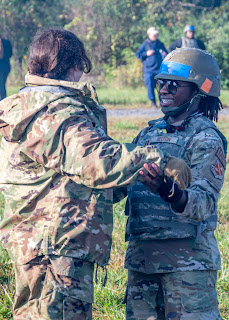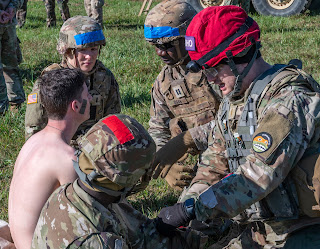‘Bushmaster’ Prepares Mental Health Providers, Strengthens Interdisciplinary Collaborations
The Uniformed Services University’s (USU) F. Edward Hebert School of Medicine (SOM), Daniel K. Inouye Graduate School of Nursing (GSN), and SOM graduate education program in Clinical Psychology (MPS) have combined efforts to ensure military mental health providers have the tools they need to provide support.
November 9, 2023 by Sarah Marshall
Mental health professionals play an essential role in military operations and overall readiness. They support service members who have been exposed to traumatic events or stressful situations, and also provide skills to help build unit resilience and reduce stress – a critical component to overall readiness.
The Uniformed Services University’s (USU) F. Edward Hebert School of Medicine (SOM), Daniel K. Inouye Graduate School of Nursing (GSN), and SOM graduate education program in Clinical Psychology (MPS) have combined efforts to ensure military mental health providers have the tools they need to provide this imperative support.
Operation Bushmaster. The exercise takes place in October at Fort Indiantown Gap, an Army National Guard training center near Harrisburg, Pennsylvania. Operation Bushmaster is designed to enhance the student operational experience – immersing them in a simulated combat environment, complete with mock explosions, moulaged “casualties,” reality-based missions, and helicopter evacuations using real helos and a helicopter simulator. The exercise is also a final exam for USU’s fourth-year medical students.For second-year students in the GSN’s Military Behavioral Health for Advanced Practice Nursing and Psychiatric Mental Health Nurse Practitioner programs, along with third-year students from the MPS graduate program, Bushmaster is also an opportunity to practice establishing a Combat Operational Stress Control Clinic (COSC). Following exposure to a stressful or traumatic event in combat or military operations, COSCs are established to help prevent, identify, and manage the effects of these combat and operational stress reactions, ultimately to enhance mission performance and resilience.
During Bushmaster, the students had the opportunity to design and implement a COSC that provides a multitude of care to the “casualties” – first-year medical student roleplayers – such as psychological first aid, triage and stabilization, behavioral health treatment, and consultation and education, including briefings on the importance of well-being for the caregiver.
Not only were they assessing the behavioral health needs of these “casualties” following a number of simulated scenarios – such as natural disasters – they also provided real-world assessment of the fourth-year medical students’ mental health needs throughout the exercise. Later, students provide well-being data and feedback to the faculty who were running the field exercise, explains Air Force Maj. Abby Diehl, MPS director of Military Psychology Studies. She adds they also provided first-year medical students with real-world wellness briefings, emphasizing the importance of promoting wellness and healthy habits, especially in stressful situations.
“Over the last several years, the curriculum has continued to evolve, and has become an essential part of our students’ interprofessional training,” Diehl says.
Participating in Bushmaster gives these students a chance to gain realistic practice in a simulated deployment environment, while getting real time feedback on their behavioral health skills, she adds. It also tests their confidence in dealing with uncertain situations as well as practice thinking flexibility and applying leadership skills in an austere environment.
The experience is really unique, says Army Maj. Doug Taylor, assistant professor in the GSN’s Psychiatry Mental Health Nurse Practitioner program. While the students are participating in various roles within a combat operational stress clinic, they are also fostering interdisciplinary relationships within many other medical specialties, and receiving feedback from faculty.
“They are really getting the opportunity as behavioral health providers to learn what it is like to do this type of work in a stressful environment and then get immediate feedback from psychiatry faculty, psychiatric nurse practitioners who are there,” Taylor says. “They are also using their clinical knowledge in different situations, while functioning as leaders and learning how to best communicate with each other. It’s really become a solid program, and it’s very impressive.”
Student Perspective
Several students expressed how much they appreciated their experience at Bushmaster, which not only gave them the chance to practice their skills in an austere environment, but also to learn from mistakes, and receive valuable feedback from faculty.
For Navy Lt. Cmdr. Mark Schmidt, a psychiatric nurse in the GSN’s Psychiatric Mental Health Nurse Practitioner program, the experience was also humbling. He explains that he has been working in the field of behavioral health for more than a decade, and as he ran a Psychological First Aid group during the exercise, he realized there were still things he could do better.
“We always have more to learn, always have room to improve, and can continue to grow so we can be the best providers we can be for future patients,” Schmidt says.
Schmidt also appreciated the chance to be in the field, and have hands-on involved field care, and to experience being on the “front lines.”
“We didn’t know we were going to be involved in their (simulated) mass casualty, and they didn’t know we would be participants, either, until it actually happened,” he says, and it truly allowed them to put their skills to the test.
Schmidt adds that when setting up a COSC, he found it very fulfilling to have to think outside the box and come up with solutions to problems that presented in a simulated deployed environment, with limited assets and resources available.
“It was also very rewarding to help people problem solve through the very creative problems that were presented to us, finding ways to help them deal with common (and not so common) difficulties that can occur during deployment, including complications such as relationships with families back at home, reintegration concerns post deployment, dealing with an increased [operating] tempo, etc.,” Schmidt says.
 |
Air Force Capt. Chantel Balfon was among the many GSN students who helped stand up a Combat Operational Stress Control Clinic (COSC) during Operation Bushmaster. (Photo credit: Tom Balfour, USU) |
“We need to be intentional with doing self assessments and making sure we are taking care of ourselves, if nothing else to make sure we are the best version of ourselves we can be to take care of our patients,” Schmidt says.
Army 1st Lt. Madison Warner, a doctoral candidate in her fourth year of the MPS Clinical Psychology program (military track), participated as a student last year. This year, as a teaching assistant for Diehl, she was able to gain a new perspective, watching the behavioral health students adapt to new challenges during the exercise, while working alongside the medical students.
“This year has given me a widened perspective of the effort put into making this operation great,” Warner says. “Going from being a student in Bushmaster last year, to a TA this year has also made me appreciate the willingness to show up from students. This operation is nothing without their sense of purpose, and I appreciate it.”
Operating in high-stress environments, like those that are simulated during Bushmaster, also reminds her of the bigger picture, and also why she joined the military.
Andrew Ton – the only civilian in the class who attended Bushmaster – brought yet another unique perspective. The third-year doctoral student in the MPS Clinical Psychology program (civilian track) earned his undergraduate degree in psychology from the University of Washington. He then got involved in research with the Department of Veterans Affairs Puget Sound, working on a study for peer-based suicide prevention intervention – and that is where he knew he wanted to dedicate his career to suicide prevention in the military.
As a civilian, Ton’s experience at Bushmaster was somewhat of a culture shock, he says, donning a uniform and being in a simulated deployed environment. But the invaluable experience will nonetheless allow him to better understand and appreciate those he will spend his career serving.
“Being exposed to what service members experience, even if simulated, provided me with a better understanding of the challenges and conditions that service members and military psychologists are faced with,” Ton says.
The biggest takeaway, Ton adds, was working with his team.
“I truly got to understand what camaraderie means and what it looks like in action,” Ton says. “The psychology and nursing students worked beautifully together in organizing the COSC, delegating tasks, and most importantly, just checking in on each other to see how we were doing.”
Ton adds that he also learned to rise to the occasion, while honing in on his leadership skills. For instance, while everyone had an opportunity to play the role of “commanding officer” or “executive officer” at some point during the exercise, this forced him out of his comfort zone – an opportunity, he realized, that would allow him to grow. To be a successful leader, he says, it’s important to approach new challenges, even if it means being uncomfortable.
“As I encountered new problems and obstacles, I had to adjust and quickly make decisions,” Ton says. “For example, I made the call to change how the COSC was triaging patients. From there, the rest of the operations appeared to run smoothly.”
Perhaps most importantly, Bushmaster was a chance to emphasize the important role mental health providers play in military operations and overall readiness.
“This exercise has highlighted the importance of taking a brief moment to ask your teammates how they are doing, and if they need anything,” Ton says. “Such small gestures go a long way in improving unit cohesion, respect, and humanity.”




